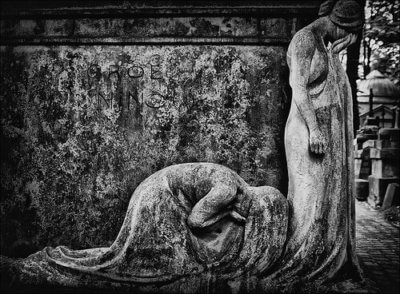“Why Do I Feel Hopeless All the Time?”

By: Caleb Roenigk
by Andrea M. Darcy
What is hopelessness? It is when we feel that we have no options left.
If we were a balloon, it’s not just that all the air is gone. We are sure there is also a hole in the rubber, and that there is no feasible way we will ever recover from our utter deflation. “Why do I feel hopeless? Because I am hopeless.”
But when you understand what hopelessness really is, you’ll realise that most of us have far more options than we realise.
Symptoms of hopelessness
Not sure if what you are feeling is hopelessness, or you are just feeling low?
If you work with a counselling psychologist they might use a special questionnaire with you, the ‘Beck Hopelessness Scale’, that actually rates your level of hopelessness (yes, really).
But you can tell for yourself by looking for the main symptoms of hopelessness:
- losing interest in things you used to care about
- no motivation to do anything
- low self-esteem
- negative thinking.
This last one, negative thinking, is important, and connected to all the others. Hopelessness is about the future (and what we perceive as a lack thereof). And as we are not in the future, how do we get there? With our thoughts. And unless we are living through a war, natural disaster or great loss, then the thoughts we have when we feel hopeless are rarely based in fact.
So why do you feel hopeless? You are generally being driven by negative perspectives, beliefs, and assumptions.
Are you thinking yourself hopeless?
Many of these patterns of non-fact based thinking we practise when feeling hopeless are what is called ‘cognitive distortions’ in psychology. These can include:
- all or nothing thinking (I have no future, I will never be happy again, nobody will ever love me).
- catastrophising (everything will go wrong, it’s the end of the road).
- fortunetelling (it will never get better, if I tried something bad would happen).
- labelling (I’m a loser, it’s a failure).
- discounting the positive (yes, I didn’t lose my job, but I’ll definitely be in the next round of cuts).
Of course it’s not as simple as just ‘deciding to think positive’. Thoughts such as these can be hard to control, are ways of thinking we’ve used for so long we don’t even know how to think differently, and/or are related to deep-seated issues.
Why do I feel hopeless all the time?
It’s normal to feel hopeless if you have recently experienced a big overwhelming life change like a natural disaster, accident, bereavement, divorce, or breakup. In this case you need to give yourself several months to work through your emotions and eventually a sense of hope returns.
But if you have actually felt hopeless for a long time – for several months, years, or even, secretly, for most of your life – then it’s likely that you have had a traumatic experience in your past that has damaged the way that you think about yourself, others, and the world.
This might have been a childhood trauma, such as abuse, neglect, abandonment, or poverty. Or it could be that you did not have an opportunity to form a loving, trusting bond with a caregiver as an infant, leading to attachment issues.
Why you need to pay attention to hopelessness

By: eflon
If hopelessness is something you’ve felt for a long time, then it can feel so normal to you that you don’t even realise how much of a problem it is. You simply can no longer imagine a life where you feel that you have worth, and that your future has hope in it.
But it is very important to seek help if you recognise yourself in descriptions of hopelessness. Helplessness is a symptom of various mental health issues and, if left untreated, can leave you more vulnerable to feeling suicidal.
Hopelessness and mental health issues
Not surprisingly, feeling hopeless is one of the major symptoms of depression.
But it’s also a part of the following mental health issues:
- anxiety
- addictions and substance abuse
- bipolar disorder
- eating disorders
- post-traumatic stress disorder (PTSD)
- borderline personality disorder.
What sorts of talk therapy can help me with feelings of hopelessness?
Cognitive therapies are often suggested for feelings of hopelessness. They work to help you recognise an change the link between your thoughts, feelings, and behaviours. (Read our article that explains all the different types of cognitive therapy for more).
Existential therapy is another approach altogether that some find useful for hopelessness. It uses philosophy to help you determine what actually matters for you, and how you can make steps toward a life that feels meaningful.
Would you like to talk to an experienced counsellor or psychotherapist about your feelings of hopelessness? Harley Therapy now connects you to professional talk therapists across the UK, as well as worldwide via Teams & Zoom.
Have a question about hopelessness, or want to share your own experience with it? Post in our public comment box below.
 Andrea M. Darcy is a health and wellbeing writer as well as mentor, trained in person-centred counselling and coaching. She often writes about trauma, relationships, and ADHD. Find her on Instagram @am_darcy
Andrea M. Darcy is a health and wellbeing writer as well as mentor, trained in person-centred counselling and coaching. She often writes about trauma, relationships, and ADHD. Find her on Instagram @am_darcy






i am very upset because i am homosexual the past but my late parents & my estranged brother been cruel,destroyed ,damaged life well over they always stop it stop it lots really they said “stop fiflltiy ” lots of this really but they really never understand on my own mind so i was been lots of cry at my bedroom but my own roof under council give me but do not they name of my name is Poole council but my estranged brother been telephone to Poole council over this but they never explain me they still never said they was fake infromation lots really why my late mother wants me stay home who not allow freedom but now bit difficult to says freedom spoken yet they won’t tell me about it my estranged brother been another lady but thank god they gone that’s over, i now live alone well i wish like living in Istanbul area very much but more risky in Istanbul location the future thanks reggie andrews
Hi Reggie, you sound really distressed. We’d just let you know that if you are feeling hopeless and live in the UK there are many free hotlines you can call where you can talk to a very nice volunteer. You can find a list of these places here http://bit.ly/mentalhelplines. Also we’d suggest you talk to your GP and ask if they can get you some free counselling on the NHS. A counsellor will listen and not judge, they create a very safe space for you.
I think your article has missed an entire group of people who feel hopeless – not because they are self-loathing and life will never improve, but rather because they’ve accomplished significant life goals, made a difference, and accomplished so much in contributing to a better world. Amazing things! And they are self-confident and insightful enough to realize they have good hearts and try to do the right thing. But it gets tiring, maintaining such high energy. It feels like there’s nothing left to accomplish. Been there done that, and not really interested in climbing Mount Everest/whatever. Why bother. What’s the point of all of this? Hopeless.
Lily, this is such a good point. Thank you for sharing it. In a way connected to burnout, but not really. As the question is, what is all this striving about? Is it really the striving that is burning you out? Or is it the deeply hidden reason for the striving? That the striving can’t really fullfil? So you are left in cycles of great effort followed by despondency? Which can be a very old hidden pattern where we are trying to get the attention of the world in lieu of parents who didn’t give it, or we are trying to feel a sense of purpose as deep down, very hidden, we are not sure we feel worthy……we can tell ourselves we are more sensitive, smarter, have more to give, we just see the world as others don’t… but deep down there are often these hidden issues that make us just like everyone else. Also this really this sounds like a sort of depression. There is a kind of depression referred to as ‘walking depression’ as you go and go and go and go and go… but somewhere inside we feel numb and hopeless.
This article presupposes that there is a correct/healthy way of being. That life has purpose or meaning- and that it isn’t an accident. It fails utterly to address the idea that all of what we do is futile. That our ideas of right and wrong, good and evil- aren’t just incorrect, but entirely irrelevant. That ALL thoughts, feelings and drives serve only to perpetuate life’s existence for fear of death. Why is it objectively better to exist than to not exist? Why not choose death if one has decided that life is not their cup of tea? I have heard so many arguments for living and I’m tired of it. Here are some positives about death: an end to anxiety and fear. An end to struggling, striving, and stress. No pain, no confusion, no hatred or rejection. No choice. Never having to think or plan or strategize. An end to miscommunication. No more stimulus. No more ANYTHING. That, to me, sounds amazing. Life is overrated and the only reason I choose to continue living it is out of respect and caring for those my death would negatively impact.
Dear Caleb. And yet here you are, somehow having googled something to end up on an article on hopelessness. And that tiny thing inside that got you to here, that is your will to live. The ‘you’ behind the negative thinking you defend yourself with, behind the ego voice, and its desire for destruction, that knows there are things worth being here for, even if right now you are in unbearable emotional pain. You are free to think as you will. To do as you will. You are living in a free society, unlike many others. But you are also free to not want to believe all the cr*p your mind throws up to keep you down, and to wonder, even just for a moment, if maybe there are other ways, if maybe you are a slave to your thoughts and that you are choosing, without realising it, to recreate pain again and again, but could un-choose this and slowly but surely, tiny step by tiny step, start in another direction. Not a life that is ‘pain free’ or ‘struggle free’ – this exists for no one. But a life where you can have pain and struggle but not rigidly refuse to see the balance. The things that are going right. That you live in a free society, that people care about you, that you have a computer to write this message on…. the health and wherewithal to even write at all. You are a valuable person. Again, there are people who care about you, you admit it in the last line. So maybe start being valuable to yourself instead of telling yourself you are nothing at all. Again, up to you. These are just ideas. But we think you deserve better than this. We think you could learn to think in totally different ways that widen your perspective to see what is going right and not just wrong. It would be hard work. But isn’t it just as much work to maintain all this negativity and fury day in and day out? Something to think about.
I’m hopeless because of the state of the world and the current situation my life I no longer want is in. Like even when I get a job I’ll probably not be able to afford housing. Math n stuff. Fuck this life. It’s not worth living.
Literally the numbers just don’t add up to having even a slight chance. When I find the courage to kill myself there will be no family or friends to notice I’m gone. Loneliness is also a legit reason to commit suicide.
“Things can get better.” Ah ha ha ha ha
Know anyone whose life has been easier lately?
In response to E’s comment…this is how I, too, have felt for maybe eighteen months now. Whatever I do to better my situation, fails. I can’t make anything better, or fix anything, or improve my situation. I just keep failing, and failing, and failing, though I am trying so hard to get right! It all feels lost; the effort pointless. I hate my life, but I can’t make anything better; I am perpetually chasing my own tail, whilst achieving sweet fuck all. And hopelessness is now the only emotion I am still able to feel; so I think, Why am I even doing this? This is so pointless. But then my little girl drops her bone and she and her brother jump up beside me and wag their tails and I remember that I promised them I would really, truly try, to get out of this hellhole mindset into which I have sunk. I cannot just leave them here, alone, wondering why I didn’t love them enough to stay here with them and keep trying. Because, it’s not actually that I want to die; I just want this hopelessness to stop. That’s all. I just need it to stop. So, for them, I will keep looking for the reasons behind my hopelessness. The most likely answer, it seems, is that chronic stress and burnout are making me see things this way; a plethora of cortisol in my system maybe, or inflammation that’s clogging my lymph nodes, whatever. Something is influencing how my body and brain function. It’s colouring my perspective. But I can change that, if I keep trying. And maybe something is messing with your brain chemistry too; it’s worth a shot, right? It’s certainly better than continuing on, in this vein. Good luck to you; I hope you find the culprit for your hopelessness and experience some relief.
I just feel hopeless. Everything is fine though just way it should be. I have a job I love but I just don’t have anything to look forward to. I work in the travel industry and now that I finally get to travel to my dream destinations, I just don’t feel happy or excited about it, like its happening great but I don’t feel ecstatic about it anymore. I have a place of own to live, I like doing my household chores but it still makes me sad for no reason. I love my parents and my brother, I miss them a lot too, but I avoid their calls all the time and even I do call them I usually just do my household chores without really engaging in the conversation. I try to end the calls as soon as possible but the second I do I feel bad and I miss them. The same goes with my bestfriend. I love her and I miss her a lot but I’ve stopped picking up her calls. I make excuses to her later. I feel horrible but I just don’t feel like talking to anyone, but then I sit and cry at night alone because I’m alone and I have no one to share anything with. I workout regularly, focus on my physical health and eat healthy but it still doesn’t make me feel motivated. I’ve been losing weight, reaching my fitness goals but it still doesn’t make me happy. I live in my head and I live more in the the fantasy world in my head. I detach. I daydream a lot and I feel happy there but not something I can ever live in or bring into reality. I don’t want to kill myself or die at all, but if I die I don’t think I’d be scared or sad about dying. I just have nothing to look forward to. I don’t want to go back being a kid but I also don’t want to be an adult. I just don’t know what to do.